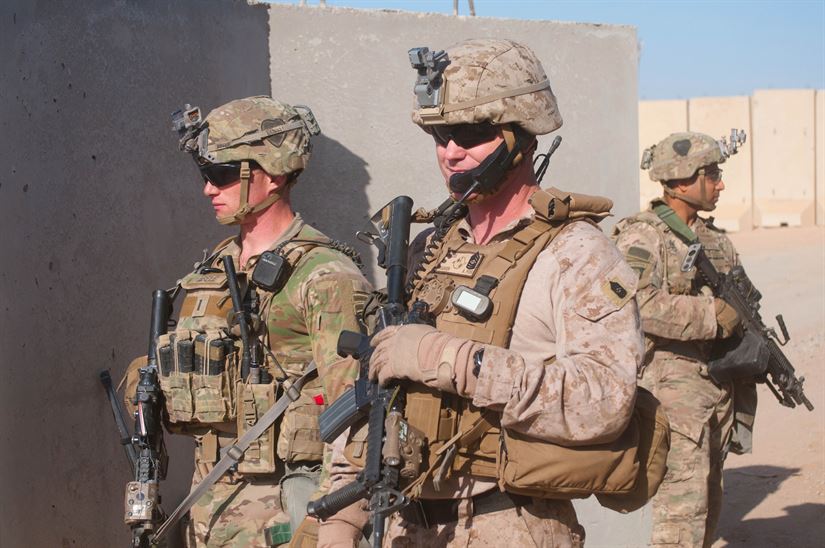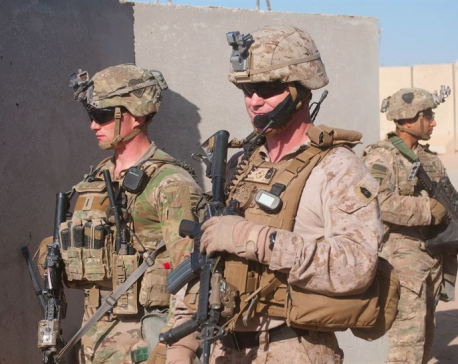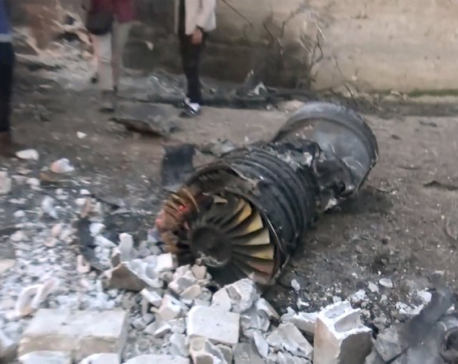
OR
U.S. says no timeline for Syria withdrawal as fighting continues
Published On: January 5, 2019 09:39 AM NPT By: Reuters

WASHINGTON, Jan 5 : The United States has no timeline to withdraw troops from Syria but does not plan to stay indefinitely, a senior State Department official said on Friday, a strong signal that forces could stay until the fight against Islamic State militants ends.
U.S.-backed forces are still retaking territory from Islamic State in Syria, Pentagon officials said on Friday, two weeks after Washington said it would withdraw its roughly 2,000 troops there. At the time, President Donald Trump said the troops had succeeded in their mission and were no longer needed there.
The administration’s abrupt announcement last month, which took officials in Washington and allies by surprise, contributed to Jim Mattis’ decision to resign as U.S. defense secretary and prompted concern that Islamic State could stage a comeback.
The State Department official, briefing reporters before a visit to the Middle East next week by Secretary of State Mike Pompeo, appeared to be seeking to allay that concern.
“We have no timeline for our military forces to withdraw from Syria,” said the official, who asked not to be identified.
“It will be done in such a way that we and our allies and partners maintain pressure on ISIS throughout and we do not open up any vacuums for terrorists.”
The United States did not intend to have an indefinite military presence in Syria, the official added.
U.S. officials have told Reuters a withdrawal could take several months, potentially giving time for U.S.-backed forces to deal parting blows to the militant group that once held broad swathes of territory in Iraq and Syria.
But a senior administration official traveling with White House national security adviser John Bolton on a trip to the Middle East said Trump had received assurances from his military commanders that their mission “can be done in weeks.”
Trump said on Wednesday the United States would get out of Syria slowly “over a period of time” and would protect U.S.-backed Kurdish fighters in the country as Washington draws down troops.
“Bolton will travel to Israel and Turkey to discuss the withdrawal of U.S. forces from Syria, and how the U.S. will work with allies and partners to prevent the resurgence of ISIS, stand fast with those who fought with us against ISIS, and counter Iranian malign behavior in the region,” Garrett Marquis, a spokesman for the National Security Council, said.
Marquis said Bolton would be joined in Turkey by Chairman of the Joint Chiefs of Staff General Joseph Dunford and U.S. special Syria envoy James Jeffrey.
Separately, the State Department said Jeffrey would be taking on the additional role of the special envoy for the coalition to defeat Islamic State.
Jeffrey will be involved in negotiations on a political process and also assumes the diplomatic role of coordinating with allies and partners on the fight against Islamic State.
Brett McGurk, the previous special envoy for the global coalition to defeat Islamic State, quit last month over Trump’s decision to pull U.S. troops out of Syria.
‘FINAL BLOWS’
The U.S.-backed Syrian Democratic Forces, which include Kurdish fighters, captured the Syrian town of Kashmah on Jan. 2 after retaking the town of Hajin on Dec. 25, Pentagon spokesman Navy Commander Sean Robertson told Reuters.
The capture came the same day that Trump stated during a cabinet meeting his strong desire to gradually withdraw from Syria, calling it a place of “sand and death.”
Trump also said it was up to other countries to fight Islamic State, including Russia and Iran, adding that Islamic State was down to its last remaining bits of territory in Syria.
“We’re hitting the hell out of them, the ISIS people,” Trump said, using an acronym to refer to Islamic State, adding, “We’re down to final blows.”
Separately on Friday, the U.S.-led coalition said it carried out 469 strikes in Syria between Dec. 16 and Dec. 29 that destroyed nearly 300 fighting positions, more than 150 staging areas, and a number of supply routes, oil lubricant storage facilities and equipment.
Islamic State retains control of just a “sprinkle of villages” near the Euphrates river, said Aaron Stein, the Middle East program director at the Foreign Policy Research Institute.
“(ISIS) will simply revert to a diffused rural insurgency where it could use just the tyranny of space - the desert is very big - to sort of hide out and be able to launch raiding attacks,” he added.
The Pentagon spokesman said coalition forces, which Washington coordinates, were continuing to assist the SDF with close air support and artillery strikes in the Middle Euphrates River Valley.
“We will continue to work with the coalition and regional partners toward an enduring defeat of ISIS,” Robertson said. He called the capture of Hajin significant.
“This was a milestone, since it was among the largest of the last remaining ISIS strongholds in the Middle Euphrates River Valley.”Islamic State declared its “caliphate” in 2014 after seizing large swathes of Syria and Iraq. The hardline Islamist group established its de facto capital in the Syrian city of Raqqa, using it as a base to plot attacks in Europe.
Much of the U.S. campaign in Syria has been waged by warplanes flying out of Qatar and other locations in the Middle East.
You May Like This

Official says US to withdraw all American troops in Syria
WASHINGTON, Dec 19 : The Trump administration will withdraw all of the approximately 2,000 American troops in Syria, according to... Read More...

U.S. plans for more than 5,000 troops to be withdrawn from Afghanistan
WASHINGTON, Dec 21: President Donald Trump is planning to withdraw more than 5,000 of the 14,000 U.S. troops in Afghanistan,... Read More...

8 Turkish troops die in Syria operation; Russian pilot slain
BEIRUT, Feb 4: Turkey said eight of its troops were killed Saturday in Ankara’s military operation against a Syrian Kurdish militia,... Read More...




Just In
- MoHP cautions docs working in govt hospitals not to work in private ones
- Over 400,000 tourists visited Mustang by road last year
- 19 hydropower projects to be showcased at investment summit
- Global oil and gold prices surge as Israel retaliates against Iran
- Sajha Yatayat cancels CEO appointment process for lack of candidates
- Govt padlocks Nepal Scouts’ property illegally occupied by NC lawmaker Deepak Khadka
- FWEAN meets with President Paudel to solicit support for women entrepreneurship
- Koshi provincial assembly passes resolution motion calling for special session by majority votes







_20220508065243.jpg)





Leave A Comment